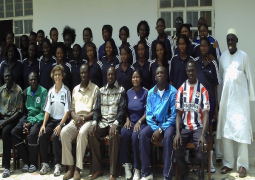It is forty six years after independence and there is ample evidence that The Gambia is still grappling with key development challenges, despite the numerous gains that are being registered. The ‘poverty level remains high amidst other disturbing indicators in the areas of maternal and infant mortality, HIV/AIDS prevalence and in hygiene and sanitation’, Yankuba Dibba, board chairperson of TANGO has said.
Dibba, who was speaking yesterday at the launching of the TANGO Policy Dialogue held at the TANGO office in Kanifing, opined that the provision of quality, affordable and accessible social services such as education, health care and utilities add to these challenges.
He underscored his office’s appreciation of the efforts of the government and its development partners in the drive towards achieving national development objectives.
The TANGO policy dialogue provides a unique opportunity for policy and decision makers, researchers, and students, development workers, journalists and the general populace in accessing relevant and up-to-date information on key development issues about The Gambia and world.
Held under the theme: “Rethinking National Development – from Outputs to Outcomes”, the launching of the policy dialogue also coincided with a forum discussion among stakeholders.
The discussions, among others, focused on an analytical overview of the
This, officials said, will raise the question as to how well the economy has created the necessary enabling environment to reflect the fact that the private sector is considered the main engine of growth, and responsible for the generation of national wealth and employment.
According to Dibba, the policy dialogue has been deliberately conceived to add value to these efforts, by focusing on knowledge creation and dissemination as a catalyst in the country’s drive towards national development.
Also speaking at the launching was Ousman Yarbo, Executive Director of TANGO, who said the policy dialogues are quarterly interactive discussions aimed at bringing together experts from policy institutions, development organizations, academia, civil society, and the private sector.
Yabo urged for both individual and collective participation, which he added is key to the policy dialogues.
Benjamin A Roberts, Director of Business and Export Development at the Gambia Investment and Export Promotion Agency, who was the keynote speaker during the dialogue, made a presentation on the “Overview of national development- challenges, prospects and lessons”.
In his presentation, Benjamin among others gave a comprehensive economic development plan of 1975- 1986 down to Vision 2020: 1996- 2020, giving challenges, prospects and lessons from Vision 2020 and the post independence economy of The Gambia.
Mod A. Secka, Permanent Secretary at the Ministry of Finance and Economic Affairs, who also presented on “Beyond PRSP: What lessons to learn for prospect and challenges in the attainment of PAGE”, said government has recognized the important roles NGOs play and will continue to create the enabling environment for them to grow and flourish.
This, he said, is recognized in the country’s Vision 2020 and the medium-term plans such as the PRSP II and the Programme for Accelerated Growth and Employment (PAGE).
Bai Matarr Drammeh, President of the Gambia Chamber of Commerce and Industry, also presented a paper on the topic “The private sector and national development - are they compatible?” whilst Momodou B. Sarr, Executive Director of the National Environment Agency presented on the topic “Climate change: what policy, institutional and technical requirements are necessary for adoptability as a way forward for The Gambia.”
According to the GCCI President, the private sector is concerned with multiple sets of actions and commitments conducive to investment, especially in the production sectors as the basis of social and economic development, supported by inclusive government policies for economic growth through development of productive trade capacities. With this, he opined, employment opportunities will be available.



